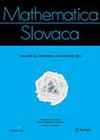Dirichlet Series with Periodic Coefficients, Riemann’s Functional Equation, and Real Zeros of Dirichlet L-Functions
IF 0.9
3区 数学
Q2 MATHEMATICS
引用次数: 0
Abstract
ABSTRACT In this paper, we provide Dirichlet series with periodic coefficients that have Riemann’s functional equation and real zeros of Dirichlet L-functions. The details are as follows. Let L ( s, χ ) be the Dirichlet L -function and G ( χ ) be the Gauss sum associated with a primitive Dirichlet character χ (mod q ). We define周期系数狄利克雷级数,黎曼泛函方程,狄利克雷l函数的实零
本文给出了具有Riemann泛函方程和Dirichlet l -函数实零的周期系数Dirichlet级数。具体情况如下。设L (s, χ)为狄利克雷L函数,G (χ)为与原始狄利克雷字符χ (mod q)相关的高斯和。我们定义f (s, χ):= q s L (s, χ) + i−κ (χ) G (χ) L (s, χ¯),其中χ¯是χ和κ (χ):= (1 - χ(−1))/2的复共轭。然后,我们证明了f (s, χ)在χ为偶数时满足汉堡包定理中的Riemann泛函方程。此外,我们证明了对于所有σ≥1,f (σ, χ)≠0。进一步证明了对于所有1/2≤σ <, f (σ, χ)≠0;1当且仅当L (σ, χ)≠0,对于所有1/2≤σ <1. 当χ为实数时,f (s, χ)与f (s) >均为零;当且仅当L (s, χ)的广义黎曼假设成立时,0在σ = 1/2线上。然而,如果χ是非实数,f (s, χ)在临界线σ = 1/2外有无穷多个零。
本文章由计算机程序翻译,如有差异,请以英文原文为准。
求助全文
约1分钟内获得全文
求助全文
来源期刊

Mathematica Slovaca
数学-数学
CiteScore
2.10
自引率
6.20%
发文量
74
审稿时长
6-12 weeks
期刊介绍:
Mathematica Slovaca, the oldest and best mathematical journal in Slovakia, was founded in 1951 at the Mathematical Institute of the Slovak Academy of Science, Bratislava. It covers practically all mathematical areas. As a respectful international mathematical journal, it publishes only highly nontrivial original articles with complete proofs by assuring a high quality reviewing process. Its reputation was approved by many outstanding mathematicians who already contributed to Math. Slovaca. It makes bridges among mathematics, physics, soft computing, cryptography, biology, economy, measuring, etc. The Journal publishes original articles with complete proofs. Besides short notes the journal publishes also surveys as well as some issues are focusing on a theme of current interest.
 求助内容:
求助内容: 应助结果提醒方式:
应助结果提醒方式:


